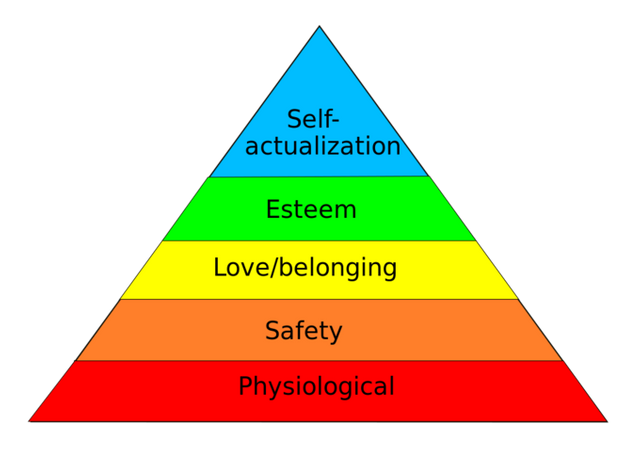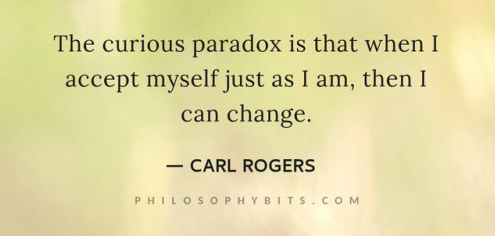Psychology Addict # 21 | Humanistic Psychology

Background
Among the general public there is, perhaps, a lack of awareness of the different kinds of perspectives existent within the field of psychology/counseling. For example, it is almost certain that you have heard of an approach called Psychoanalysis. So, what it is important for you to understand here is that whenever someone seeks help to alleviate their mental distress through this kind of approach, this will be done by a psychoanalyst who attempts to interpret the patient`s unconscious processes and childhood events. However, if another individual is to look for a behaviorist instead, whatever disorder is afflicting them will be treated by means of changing patterns of thoughts and behavior as it is the case in Behaviourism.
Both psychoanalysis and behaviorism were the most prevailing (opposing) schools of thoughts in psychology during the first half of the twentieth century. The former saw humans as faulty machines controlled by their unconscious minds, while the latter stated that such malfunctions were rather a response to environmental factors. It was in reaction to these views that Humanistic Psychology emerged in the mid twenty century.
Humanistic Psychology – The third Force

Despite the term humanistic psychology had been first used by John Cohen as a title for his book in 1958, Abraham Maslow is the one referred to as the father of the aforementioned approach.
First and foremost Maslow’s ideas of human life were at odds with those proposed by psychoanalysis. In other words, his view of human existence was not coloured by the pessimistic view held by Freud and his successors. Similarly to subsequent humanistic thinkers Maslow saw humans as possessing an innate drive towards reaching their potential (self-actualisation) and self growth. Through their holistic perspective humanistic psychologists believe that humans are beings fully capable of making choices, and that within their individuality they exercise autonomy and free-will. This, of course, contradicts the deterministic outlook of behaviourism theories, and this is why Humanistic Psychology is also regarded as the "third force".
Furthermore, Maslow is also known for his hierarchy of needs, a representation of human necessities that need to be fulfilled, one after another, from bottom to top. With the bottom being basic existential needs like food, sex and sleep (physiological); and the top, self-actualisation which is a result of morality, acceptance, lack of prejudice and creativity. By safety Maslow meant the security of body, resources and property among others; love/belonging is related to family, sexual intimacy and friends, and esteem is to do with confidence, respect by others and to others.
The person-centred approach of Carl Rogers’

Following the more positive view of human existence held by humanists Carl Rogers proposed a new approach to counseling, one that is based not on seeking a cure or relief of symptoms, but one that results in the ‘change of personality structure of the individual, at both surface and deeper levels’. It is easier to understand such an ambitious (or, for many radical) goal when one is aware of Rogers’ beliefs about human beings; and that is that individuals are never a finished product, as people are constantly undergoing transformation.
However, throughout this transformative process people go through life acting in ways that seek a sense of being approved, of being accepted; which according to both Maslow and Rogers is an innate need of human beings. Unfortunately, oftentimes it does not always work out and people end up acting and behaving against their true, core beliefs and feelings (organismic self). This is a scenario every one might have encountered in life, some more than others. Situations that impose a sense of how one ‘should feel’ (self-concept).
The person-centred approach puts forward that in spite of humans having a rather flexible idea of self, there is a limit as to how much individuals can go on in life acting in ways that take them away from their true selves. When they reach that limit incongruence arises. Incongruence according to this approach is the underlying cause of human distress (an inevitable aspect of life). It is what results from the conflict between our organismic self - what one really feels – and self-concept - what one thinks they should feel.
Therapy
There is an important point to be highlighted in this kind of therapy. Here the person looking for help is not seen as a sick individual, but rather someone who is rather in a state of incongruence and is fully aware of the cause of their distress. Therefore, the person here is regarded as a client and not as a patient. Moreover, the counselor trusts the client’s judgment of their own experiences and accepts the ways the client views their difficulties with unconditional positive regard (without judgment). This will hopefully deliver a safe environment to the client, who due to the constructive therapeutic relationship with the counselor will find their path towards change through the self-reflection of experienced emotions.
There is a lot of criticism towards the equal client-therapist relationship the person-centred approach aims at. The argument is that the therapist will always be seen as the authority figure in the relationship; however, those who approve of such perspective point out to the importance of trusting the clients as the ‘high-authority’ when it comes to their own distress. After all, there should not be fixed techniques or methods as each individual is a unique, different world requiring a new, fitting therapeutic relationship in order to achieve a particular state of congruence.

Summary:
-Humanistic Psychology emerged in the mid twenty century as a reaction to the most prevailing schools of thoughts in the field at the time: Psychoanalysis and Behaviorism.
-The American Psychologist Abraham Maslow is regarded as the founder of the humanistic perspective and is mostly known for this hierarchy of needs.
-Carl Rogers developed a new therapeutic approach, the ‘person-centred approach’ through which an equal therapist-client relationship is built in order to reach transformational goals, rather than the cure or relief symptoms.
[Original Content by Abigail Dantes 2017]
It means a lot to me 😊

Reference List:
Barker, M. Vossler, A. Langdridge, D. (2010) Understandying Couselling and Psychotherapy, London, Sage.
Mearns, D. And Thorne, B. (2007) Person-centred approach in action, London, Sage.
very good information, thanks you for sharing this with us
You got a 0.08% upvote from @postpromoter courtesy of @jout!
Fantastic psychology entry! As a psychologist it's my pleasure to follow you :)
Well @saunter, I have already been following your amazing blog! So, your kind, encouraging words mean a lot to me! Thank you and all the best 😊🌷
@abilgail-dantes, oh, this makes me so happy! I think it's really encouraging that Carl Rogers focused on transforming rather than curing. His shift in paradigm has probably helped so many. I truly believe when people exhibit destructive behavior, it's a direct reflection of who they "think" they are... and not a reflection of who they "really" are. I believe a positive change in behavior is a natural, effortless byproduct of accepting the fact that we were created to shine... rather than be defined as a hot mess by mistakes we make. It's liberating. (I'm speaking from personal experience.)
We are all butterflies even if we're acting like moths. Understanding that makes it so much easier to love everyone, starting with ourselves.
Ow .... I am so pleased that you not only liked the post @karencarrens, but also could relate to it. We all do, to an extent. I believe :D
Lots of love to you always!
:)
Hey @abigail-dantes! FYI... I nominated you... I hope you join us in the fun! https://steemit.com/photography/@karencarrens/day-five-seven-days-of-black-and-white
Most people aren’t bad, they just exhibit bad behavior. I have seen many people change just simple behavioral problems and become a whole different person. Then of course it’s about accepting the new person one has become. I am so glad you are back. Love to you friend.
You are so right ❤️
I didn't know there was a difference between psychoanalysis and behaviorism. I actually didn't know the second term was existing at all. I can imagine that only humanistic psychology is what is practiced today.
Thanks a lot for this nice post Abigail. It is nice to read form you again :)
Hello @lemouth :) thank you for taking the time to read my post! Both psychoanalyses and forms of behaviorism (like CBT) are practiced nowadays, as well as the humanistic approach. It is definitely down to each client to find which approach best suits their needs. CBT for example is often very successful in alleviating symptoms of patients afflicted by OCD.
All the best!
Oh, I understood it more like being a merging of both replacing them all... Psychology is definitely too far from physics ;)
:P
excellent post
I am very happy to read such a great post! The humanistic psychology was a big help for me when I started to work with mentally disabled people. In particular carl rogers and ruth cohn are a great inspiration since they also found a way to touch the daily practice (hope the english term is correct) with their theories. Looking forward to read more of your articles.
People who don't study psychology should read more articles like this. It was a pleasure reading your post. Thanks for sharing it. Resteemed and followed.
Thank you very much @dysfunctional :D
I appreciate your support very much!
Finally, I found someone who interst in psychology!
really helpfull for me to understanding more about psychology.
thanks !
Thank you @mayorita :)
Thank you, I was pleased to read such a good introduction explaining the difference between psychoanalysis and behaviorism. I had overestimated that it would be common knowledge to know and distinguish the two. But it's probably because I deal with it a lot in my mind and then things get so normal sometimes that it's surprising when it's new for others.
Total agreement :) If a method is forced too much, it is often more harmful than helpful for the process. A flexible suppleness of therapist and client alike is the most beautiful thing!
Glad I found you here. I followed @Zest in his comments and that brought me here. I see you're alternating your main theme with fiction. It's a very nice combination.
Have fun still further with a new "pursuer": -)
P.S. I would be pleased hearing your opinion about my last article, it might be of interest to you.
Thank you for such positive feedback @erh.germany. Yeah, you see my dear @zest only brings me good things :D. I will be checking your blog.
Best.
to you, too!